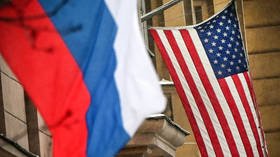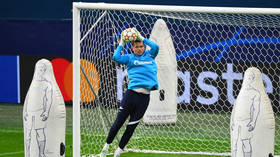Russia reveals what Putin asked of Biden
In a “frank and businesslike” conversation Russian President Vladimir Putin asked his US counterpart Joe Biden for guarantees that NATO won’t expand further east or deploy offensive weapons to countries like Ukraine.
Moscow is “seriously interested” in obtaining “reliable and firm legal guarantees” excluding NATO’s further expansion eastward and deployment of “offensive strike weapons systems in countries adjacent to Russia,” the Kremlin said in a readout of Tuesday’s call between the two leaders.
Putin’s proposal came in response to Biden’s “concerns” about Russian troops allegedly threatening Ukraine and threats of US and allied sanctions against Russia, a subject that arose during the two-hour call. The Russian leader responded that it was NATO “making dangerous attempts to conquer Ukrainian territory” and “building up its military potential at our borders.”
When asked about this, Biden’s national security adviser Jake Sullivan said that the US has made “no such commitments or concessions.”
Putin used specific examples to illustrate the “destructive” policy of Kiev, which he said was aimed at completely dismantling the Minsk agreements and the ‘Normandy format’ talks. He also expressed Moscow’s serious concerns about “provocative actions” by the government in Kiev against the residents of Donetsk and Lugansk, two breakaway regions in eastern Ukraine.
Last week, before the date of the meeting was announced, Deputy Foreign Minister Sergey Ryabkov said that the situation in Europe would be at the top of the agenda for the two leaders to discuss. The diplomat stressed that “contact is badly needed; we have multiplying problems. There is no progression on bilateral affairs, which are more and more spiraling into a phase of acute crisis.”
The talks come amid heightened tensions between Washington and Moscow over the situation on the Russian-Ukrainian border, which the White House has signaled as a key area on which bilateral negotiations are needed.
American and Ukrainian officials have repeatedly accused Russia of plotting to invade its neighbor in recent weeks. Earlier this month, US Secretary of State, Antony Blinken implored Moscow to de-escalate its purported aggressions against Kiev, or face “severe consequences.”
Russia has repeatedly denied allegations put forward by Western officials and outlets that it will launch an offensive against Ukraine. Kremlin press secretary Dmitry Peskov has blasted the accusations as groundless, dubbing them as “hysteria” whipped up in the Anglophone and Ukrainian media.
Meanwhile, Ukraine’s hopes to be admitted to NATO and the potential eastwards expansion of the US-led military bloc have been a point of contention for Moscow. Ahead of the video conference, the Russian president announced that he will request discussions with NATO to ensure the US-led military bloc does not edge closer to his country’s frontiers. Speaking last week, Putin said that he will “insist on guarantees being set out to exclude the possibility of NATO moving any further to the east, and deploying threatening weapons close to Russian territory.”
Foreign Minister Sergey Lavrov noted the day before that “significant units and armaments from NATO countries, including American and British, are being moved closer to our borders.”
The pair last met in the Swiss city of Geneva in June. The meeting was hailed as productive by the two heads of state, covering topics such as nuclear proliferation and managing the Covid-19 pandemic. However, the Kremlin said that it will take a long time for constructive engagement to return and the two sides have recently accused each other of escalating military tensions in Eastern Europe.














